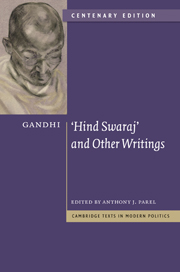Book contents
- Frontmatter
- Contents
- Preface to the centenary edition
- Acknowledgements
- Editor's introduction to the centenary edition
- Editor's introduction to the 1997 edition
- A note on the history of the text
- Principal events in Gandhi's life
- Biographical synopses
- Guide to further reading
- Glossary and abbreviations
- HIND SWARAJ
- Contents
- Preface to the English translation
- Foreword
- I The Congress and its officials
- II The Partition of Bengal
- III Discontent and unrest
- IV What is Swaraj?
- V The condition of England
- VI Civilisation
- VII Why was India lost?
- VIII The condition of India
- IX The condition of India (cont.): railways
- X The condition of India (cont.): the Hindus and the Mahomedans
- XI The condition of India (cont.): lawyers
- XII The condition of India (cont.): doctors
- XIII What is true civilisation?
- XIV How can India become free?
- XV Italy and India
- XVI Brute force
- XVII Passive resistance
- XVIII Education
- XIX Machinery
- XX Conclusion
- I APPENDICES
- SUPPLEMENTARY WRITINGS
- Bibliography
- Index
I - The Congress and its officials
Published online by Cambridge University Press: 05 October 2014
- Frontmatter
- Contents
- Preface to the centenary edition
- Acknowledgements
- Editor's introduction to the centenary edition
- Editor's introduction to the 1997 edition
- A note on the history of the text
- Principal events in Gandhi's life
- Biographical synopses
- Guide to further reading
- Glossary and abbreviations
- HIND SWARAJ
- Contents
- Preface to the English translation
- Foreword
- I The Congress and its officials
- II The Partition of Bengal
- III Discontent and unrest
- IV What is Swaraj?
- V The condition of England
- VI Civilisation
- VII Why was India lost?
- VIII The condition of India
- IX The condition of India (cont.): railways
- X The condition of India (cont.): the Hindus and the Mahomedans
- XI The condition of India (cont.): lawyers
- XII The condition of India (cont.): doctors
- XIII What is true civilisation?
- XIV How can India become free?
- XV Italy and India
- XVI Brute force
- XVII Passive resistance
- XVIII Education
- XIX Machinery
- XX Conclusion
- I APPENDICES
- SUPPLEMENTARY WRITINGS
- Bibliography
- Index
Summary
reader: Just at present there is a Home Rule wave passing over India. All our countrymen appear to be pining for National Independence. A similar spirit pervades them even in South Africa. Indians seem to be eager after acquiring rights. Will you explain your views in this matter?
editor: You have well put the question, but the answer is not easy. One of the objects of a newspaper is to understand the popular feeling and to give expression to it; another is to arouse among the people certain desirable sentiments; and the third is fearlessly to expose popular defects. The exercise of all these three functions is involved in answering your question. To a certain extent, the people's will has to be expressed; certain sentiments will need to be fostered, and defects will have to be brought to light. But, as you have asked the question, it is my duty to answer it.
reader: Do you then consider that a desire for Home Rule has been created among us?
editor: That desire gave rise to the National Congress. The choice of the word ‘National’ implies it.
reader: That, surely, is not the case. Young India seems to ignore the Congress. It is considered to be an instrument for perpetuating British Rule.
editor: That opinion is not justified. Had not the Grand Old Man of India prepared the soil, our young men could not have even spoken about Home Rule.
- Type
- Chapter
- Information
- Gandhi: 'Hind Swaraj' and Other Writings , pp. 13 - 18Publisher: Cambridge University PressPrint publication year: 2009

